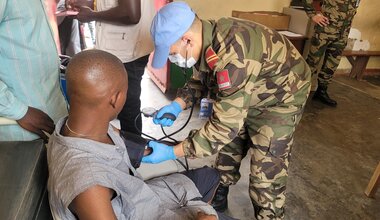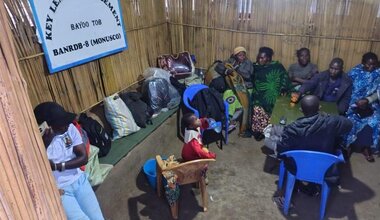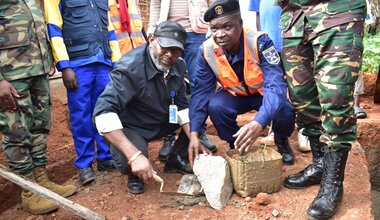Fight against COVID-19: Journalists from Beni sensitized by MONUSCO and the WHO
MONUSCO Office of Strategic Communication and Public Information organized an awareness-raising activity on COVID-19 on June 12, 2020 for 20 journalists from Beni and Butembo, in the North Kivu province. The activity took place at MONUSCO base in Madiba, Boikene, in partnership with the WHO field Coordination in Beni.
When launching the activity, the chief of MONUSCO office in Beni, Josiah Obat, who is also a journalist by profession, stressed the importance of the role of journalists and the media in the society, which is to inform the public and make them able to “decide, choose or protect themselves” if necessary.
"This is the objective we want to achieve by trying to inform you further, through specialists, both on COVID-19 and the Ebola, so that, in your turn, you can continue to inform the populations of the danger posed by not only COVID-19, against which they must protect themselves, but also the Ebola, so that once the chain of the disease is disrupted, we should no longer go back to the previous situation," he explained.
Dr. Mory Keita, the Coordinator of the WHO field office in Beni, who facilitated the information session on communication in times of crisis, said he was happy to meet the journalists and to discuss with them for the first time since this health crisis broke out, because "the media play a key role in the prevention and intervention on the COVID-19".
The public must be given accurate information about the risks they face. You must not minimize the disease, the population may fail to take this seriously.
Before getting to the heart of the matter, he tried to test journalists' knowledge of the COVID-19 through a round of question-and-answer which was the starting point for the awareness-raising. They tried to explain COVID-19 according to their understanding, and one of them even spoke of the "flu".
"The public must be given accurate information about the risks they face," said Dr. Keita, before stressing: "You must not minimize the disease, the population may fail to take this seriously, especially when you refer to it as a simple flu, they may each interpret it differently… You should rather highlight how serious it is while giving them reliable information to support these statements,” he underlined.
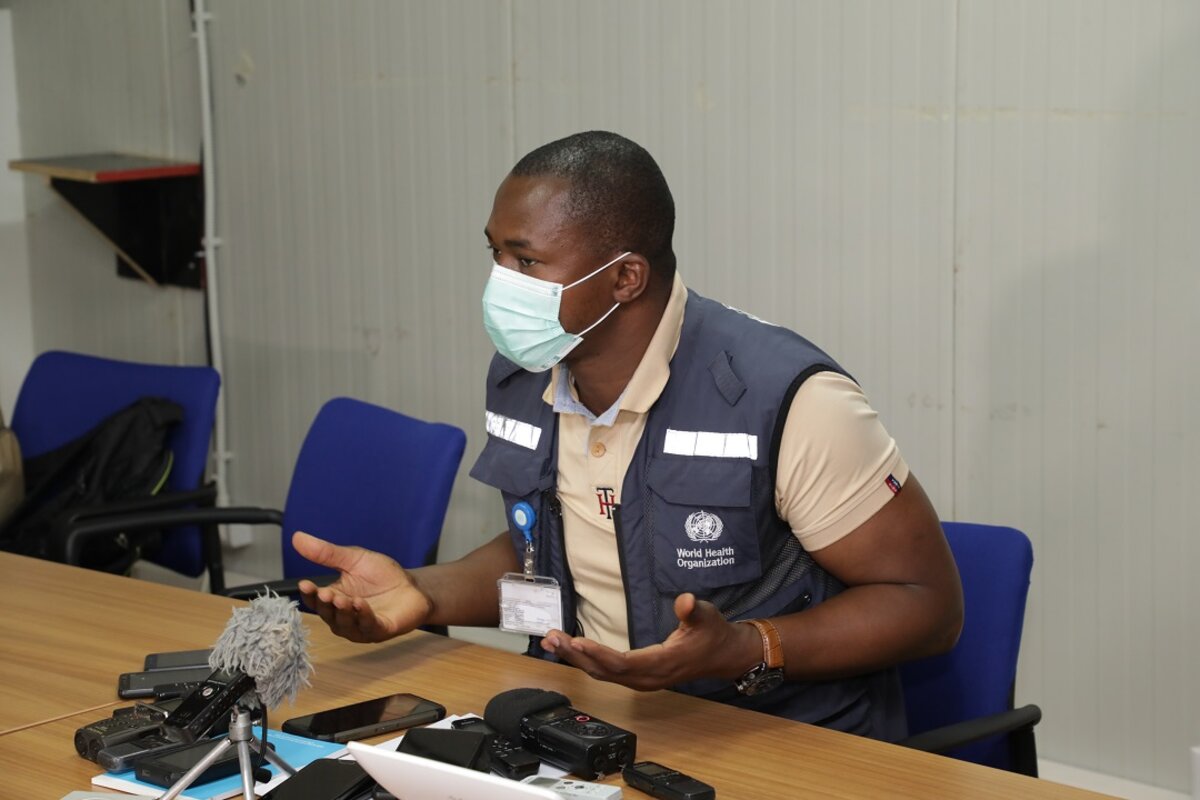
Doctor Mory Keita gave an update of the COVID-19 death toll report so far in the world which is more than 400,000 deaths. “This almost represents the population of Beni (355,000). Could you figure out an entire city being wiped out of the face of the earth. This can show how serious the situation is, and lead the people concerned to understand the risks they face, " he insisted.
As journalists, "you need to get fully informed about the situation, the guidelines and the specific information about COVID-19 in all its aspects, convey messages in the language people understand while maintaining accuracy, or find an accurate source or validation of experts and serve as a good bridge connecting people, including experts and the common people," said the doctor, before advising against the spread of false information.
During the debate, the journalists sought to understand, in particular, how someone can be healed from the disease when no treatment is yet available.
To this question, Dr Mory Keita underscored that each country has tried to set up a treatment protocol in a bid to treat the sick, even if there is not yet an appropriate treatment. This is the case with Chloroquine, he said. Even if the trials have not yet shown one hundred percent the effectiveness of the drug.
To the question, why the patients were not quarantined at the very beginning of the Ebola Virus Disease, in the territory of Beni, as in the case of the COVID-19, WHO coordinator emphasizes this could have been done: “With COVID-19, we are learning and we have indeed learned about the protective measures, and we will learn useful lessons for the future. If it had to be done again, Mangina could have probably been quarantined."
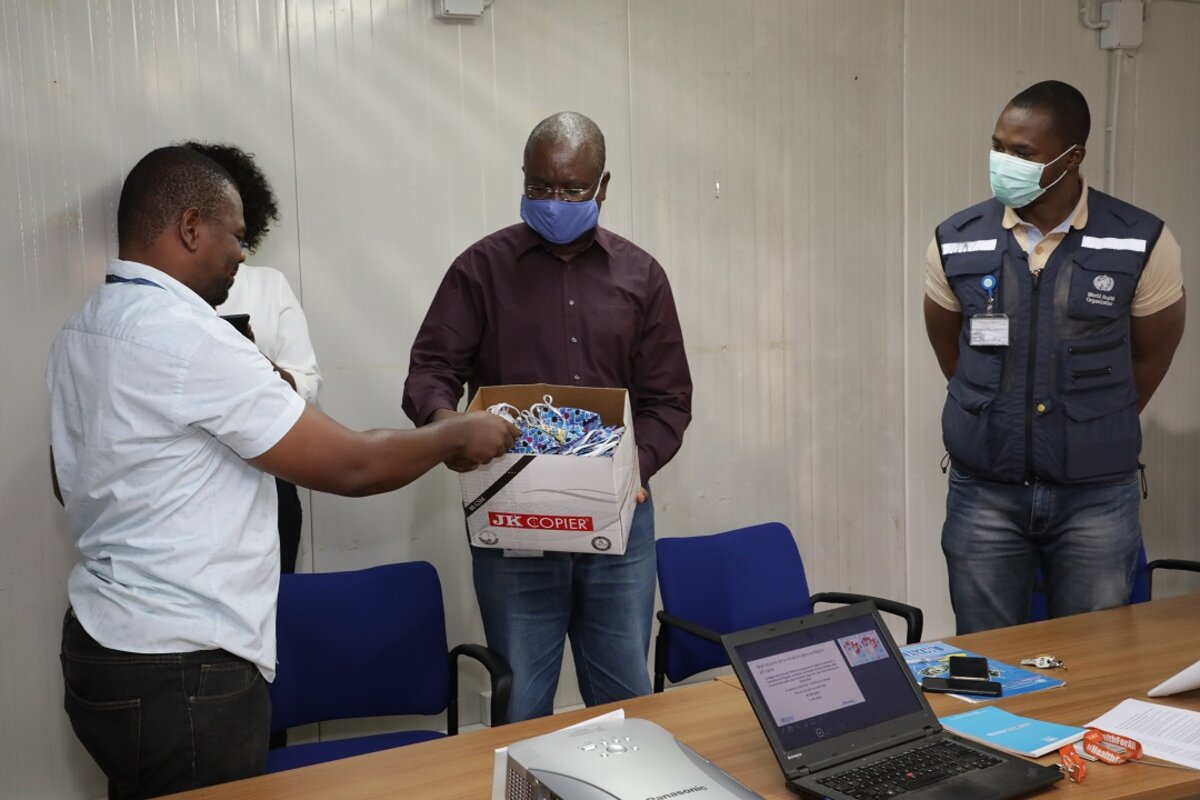
In any case, discussions were very productive and the journalists, in their recommendations, requested that such awareness sessions be duplicated for those who were unable to take part. Because of COVID-19, the number of journalists was restricted to 20.
MONUSCO took the opportunity to hand over 150 artisanal masks and 75 notebooks stamped MONUSCO to UNPC (National Union of the Congolese Press, Beni section) for the media outlets; a donation by the Office of Strategic Communication and Public Information of MONUSCO / Beni.
 UN
UN United Nations Peacekeeping
United Nations Peacekeeping




